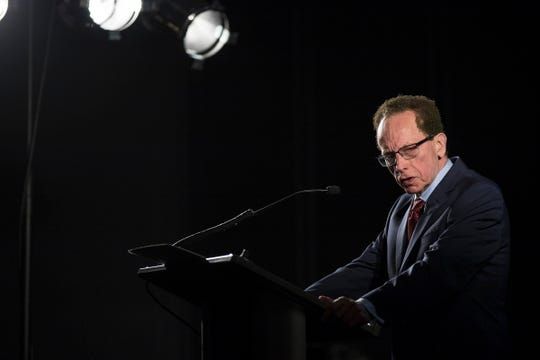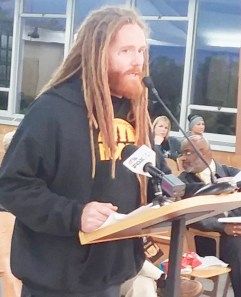Ann Arbor taking steps to allow recreational marijuana shops
ANN ARBOR, MI – Recreational marijuana shops are coming and city leaders aim to embrace them.
Ann Arbor has drafted new rules to allow several different types of recreational cannabis enterprises.
That includes new “marijuana micro-businesses” and onsite consumption establishments serving adults 21 and older, in addition to growing and processing facilities and retail dispensaries.
The city already is home to many medical marijuana businesses that are now planning to expand into a new market.
Acknowledging Ann Arbor’s decades-long history of pot activism, City Council voted 8-2 to initially OK a pair of ordinances laying out the new rules Monday night, Sept. 16.
They include allowing temporary permits for events with onsite sale and consumption of marijuana.
The draft rules are expected back at council for public hearings and final approval in October, just before the state begins accepting license applications from recreational marijuana businesses Nov. 1.
Michigan voters legalized marijuana in November 2018 and hundreds of communities across the state have since banned such businesses locally, but Ann Arbor is signaling they’ll be welcome here.
Consumption establishments are defined as any commercial space licensed by the state to allow adults 21 and older to consume marijuana products onsite.
City leaders are planning to allow dispensaries to double as consumption establishments or social-use clubs with proper permits.
A marijuana micro-business is defined as a business that cultivates up to 150 plants, processes and packages cannabis products and sells them to people 21 or older or to safety-compliance facilities. They can’t sell their products to other businesses.
Council Members Jeff Hayner, D-1st Ward, and Jane Lumm, I-2nd Ward, voted against the draft rules, arguing they’re not ready for “prime time” and there’s no need to rush.
“Ann Arbor is going to be marijuana central if we pass all this stuff,” Hayner said.
Hayner raised concerns there were no limits on the number of permits that could be issued for various types of marijuana businesses, except for the city’s existing cap of 28 for dispensaries. He suggested a 36-permit cap in each marijuana business category.
A majority of council members instead chose to keep the 28-permit cap for dispensaries (26 are approved already) and equally cap the number of consumption establishments and micro-businesses at 28 each, with no caps for grow operations or other facilities.
City officials have been working on the ordinances for months, said Mayor Christopher Taylor, indicating the council needs to act quickly now if it wants them in place before Nov. 1.
It’s a topic of considerable interest to residents and deserves more public discussion and input, Lumm said, suggesting temporarily opting out of allowing recreational marijuana businesses and taking more time to work out the regulations.
“I just think it’s critical to get it right,” she said.
Others worried about the message it would send to opt out, even temporarily. Ann Arbor has been called the cannabis capital of the Midwest and is home to the long-running Hash Bash marijuana festival.
“It’s important to know that Ann Arbor has a long history with trying to decriminalize marijuana,” said Council Member Ali Ramlawi, D-5th Ward. “It started 50 years ago, and the message of opting out would have a very negative impact, I think, on the movement.”
“I’m not going to support an opting out. Ann Arbor is a leader in this area,” said Council Member Kathy Griswold, D-2nd Ward, arguing council needs to rise to the occasion and get the job done.
https://www.mlive.com/news/ann-arbo...-sure-dispensaries-sell-high-quality-bud.html
Council is planning to hold a work session Sept. 23 to discuss the regulations in more detail before considering final approval Oct. 7, when there will be public hearings.
Existing marijuana businesses in Ann Arbor have operated responsibly, Ramlawi said, adding they want to be good community partners and they know “all eyes and ears will be watching them.”
While 78% of Ann Arbor voters supported marijuana legalization in 2018, some community members have expressed concerns about marijuana facilities, council members acknowledged.
Hayner said he voted for marijuana legalization in 2018 because he’s a longtime proponent of decriminalization.
“I didn’t vote for Prop 1 to have 600 distribution and consumption facilities open in my community,” he said.
“And I have had people come up to me and say they have legitimate concerns about the placement of these, and legitimate concerns about large money flowing to the cities that do allow this use and it driving out other businesses that serve a broader portion of the community.”
A former preschool and the MD Bagel Fragel shop are empty now because “people are sitting on them with marijuana money” in anticipation of recreational marijuana, Hayner said.
“There’s going to be money flowing here from all over the place, and so I think it’s reasonable to have limits on all of these,” he said.
“Unless we want to just take the lid off and turn into, you know, marijuana central.”
Hayner also questioned why the city’s draft rules don’t allow marijuana consumption establishments in office districts.
They’re more of a transactional, retail-type use, said Brett Lenart, the city’s planning manager.
Hayner noted the city recently changed zoning rules to allow restaurants in office areas.
“Maybe somebody’s employer would allow them to do a bong hit at lunch or whatever,” he said.
The proposed zoning rules limit where marijuana businesses can be located and include buffer requirements to avoid clustering.
Under the draft rules, no marijuana dispensary or micro-business could be within 600 feet of another, though there would be no buffer requirements between consumption establishments. Marijuana facilities still must be 1,000 feet from schools.
ANN ARBOR, MI – Recreational marijuana shops are coming and city leaders aim to embrace them.
Ann Arbor has drafted new rules to allow several different types of recreational cannabis enterprises.
That includes new “marijuana micro-businesses” and onsite consumption establishments serving adults 21 and older, in addition to growing and processing facilities and retail dispensaries.
The city already is home to many medical marijuana businesses that are now planning to expand into a new market.
Acknowledging Ann Arbor’s decades-long history of pot activism, City Council voted 8-2 to initially OK a pair of ordinances laying out the new rules Monday night, Sept. 16.
They include allowing temporary permits for events with onsite sale and consumption of marijuana.
The draft rules are expected back at council for public hearings and final approval in October, just before the state begins accepting license applications from recreational marijuana businesses Nov. 1.
Michigan voters legalized marijuana in November 2018 and hundreds of communities across the state have since banned such businesses locally, but Ann Arbor is signaling they’ll be welcome here.
Consumption establishments are defined as any commercial space licensed by the state to allow adults 21 and older to consume marijuana products onsite.
City leaders are planning to allow dispensaries to double as consumption establishments or social-use clubs with proper permits.
A marijuana micro-business is defined as a business that cultivates up to 150 plants, processes and packages cannabis products and sells them to people 21 or older or to safety-compliance facilities. They can’t sell their products to other businesses.
Council Members Jeff Hayner, D-1st Ward, and Jane Lumm, I-2nd Ward, voted against the draft rules, arguing they’re not ready for “prime time” and there’s no need to rush.
“Ann Arbor is going to be marijuana central if we pass all this stuff,” Hayner said.
Hayner raised concerns there were no limits on the number of permits that could be issued for various types of marijuana businesses, except for the city’s existing cap of 28 for dispensaries. He suggested a 36-permit cap in each marijuana business category.
A majority of council members instead chose to keep the 28-permit cap for dispensaries (26 are approved already) and equally cap the number of consumption establishments and micro-businesses at 28 each, with no caps for grow operations or other facilities.
City officials have been working on the ordinances for months, said Mayor Christopher Taylor, indicating the council needs to act quickly now if it wants them in place before Nov. 1.
It’s a topic of considerable interest to residents and deserves more public discussion and input, Lumm said, suggesting temporarily opting out of allowing recreational marijuana businesses and taking more time to work out the regulations.
“I just think it’s critical to get it right,” she said.
Others worried about the message it would send to opt out, even temporarily. Ann Arbor has been called the cannabis capital of the Midwest and is home to the long-running Hash Bash marijuana festival.
“It’s important to know that Ann Arbor has a long history with trying to decriminalize marijuana,” said Council Member Ali Ramlawi, D-5th Ward. “It started 50 years ago, and the message of opting out would have a very negative impact, I think, on the movement.”
“I’m not going to support an opting out. Ann Arbor is a leader in this area,” said Council Member Kathy Griswold, D-2nd Ward, arguing council needs to rise to the occasion and get the job done.
https://www.mlive.com/news/ann-arbo...-sure-dispensaries-sell-high-quality-bud.html
Council is planning to hold a work session Sept. 23 to discuss the regulations in more detail before considering final approval Oct. 7, when there will be public hearings.
Existing marijuana businesses in Ann Arbor have operated responsibly, Ramlawi said, adding they want to be good community partners and they know “all eyes and ears will be watching them.”
While 78% of Ann Arbor voters supported marijuana legalization in 2018, some community members have expressed concerns about marijuana facilities, council members acknowledged.
Hayner said he voted for marijuana legalization in 2018 because he’s a longtime proponent of decriminalization.
“I didn’t vote for Prop 1 to have 600 distribution and consumption facilities open in my community,” he said.
“And I have had people come up to me and say they have legitimate concerns about the placement of these, and legitimate concerns about large money flowing to the cities that do allow this use and it driving out other businesses that serve a broader portion of the community.”
A former preschool and the MD Bagel Fragel shop are empty now because “people are sitting on them with marijuana money” in anticipation of recreational marijuana, Hayner said.
“There’s going to be money flowing here from all over the place, and so I think it’s reasonable to have limits on all of these,” he said.
“Unless we want to just take the lid off and turn into, you know, marijuana central.”
Hayner also questioned why the city’s draft rules don’t allow marijuana consumption establishments in office districts.
They’re more of a transactional, retail-type use, said Brett Lenart, the city’s planning manager.
Hayner noted the city recently changed zoning rules to allow restaurants in office areas.
“Maybe somebody’s employer would allow them to do a bong hit at lunch or whatever,” he said.
The proposed zoning rules limit where marijuana businesses can be located and include buffer requirements to avoid clustering.
Under the draft rules, no marijuana dispensary or micro-business could be within 600 feet of another, though there would be no buffer requirements between consumption establishments. Marijuana facilities still must be 1,000 feet from schools.


